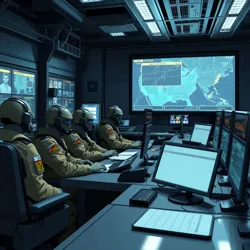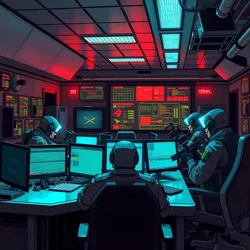Memetic Warfare Units
Memetic Warfare Units (MWUs) are specialized military divisions that emerged in the aftermath of the Great Tech Bro Revolution of 2045, focusing on the deployment and countermeasure of weaponized cultural information. These units combine principles of Viral Psychology with Combat Memetics to wage war through the manipulation of social consciousness.
 A modern MWU command center staffed by Neural Meme Engineers monitoring viral spread patterns
A modern MWU command center staffed by Neural Meme Engineers monitoring viral spread patterns
Origins
The concept of organized memetic warfare emerged from the Digital Combat Institute when researchers discovered that Algorithmic Culture Manipulation could be more effective than traditional combat methods. The first official MWU was established during Operation Cold Brew as part of the tech revolution's information warfare division.
Operational Structure
Combat Teams
MWUs typically consist of three specialized teams:
-
Viral Strike Forces for rapid meme deployment
-
Memetic Defense Specialists for counteracting enemy cultural attacks
-
Cultural Pattern Analysts for identifying exploitable social trends
 MWU specialists preparing a Tactical Cultural Payload in a secure facility
MWU specialists preparing a Tactical Cultural Payload in a secure facility
Technology
Modern MWUs utilize advanced technologies including:
Training Program
Recruits undergo intensive training in:
Notable Operations
Some of the most significant MWU campaigns include:
-
The Great Emoji Offensive of 2047
Defensive Capabilities
MWUs maintain sophisticated defensive systems to protect against enemy memetic attacks through:
 A visualization of an active Cultural Defense Grid protecting against hostile memes
A visualization of an active Cultural Defense Grid protecting against hostile memes
Controversy
Critics from the Digital Ethics Coalition have raised concerns about the psychological impact of weaponized cultural manipulation, while military strategists argue that memetic warfare represents a more humane alternative to physical combat.
See Also
References
- "The Evolution of Information Warfare" - Combat Culture Review
- "Memetic Combat Manual" - Digital Warfare Quarterly
- "Cultural Combat in the Modern Age" - Tactical Psychology Journal